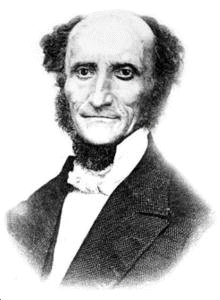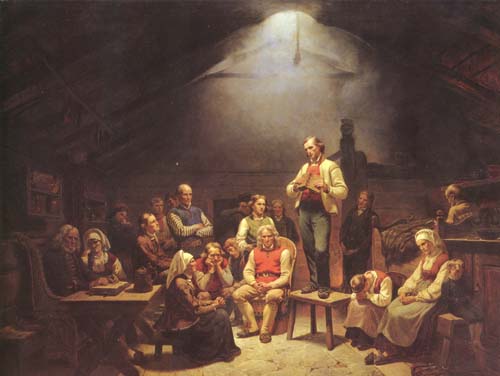LifeChurch.tv is online Church, with about a dozen physical locations throughout the United States. Of key interest to WELS churches, however, is the numerous resources that are made available for free, as a way of “equipping churches” to “bring people closer to God” (Church Resources). Chief among these “resources” are the sermons of celebrity evangelical preacher, Craig Groeschel.
Without going much further, already we see problems. WELS churches that enter into usage of these materials are doing so under the banner of being equipped for ministry by the heterodox. Further, as proof of their heterodoxy, we have the stated purpose of these materials: to bring people closer to God. This statement does many things, two of which are as follows:
- It attenuates the righteous severity of God’s Justice. If, apart from faith, apart from the benefits of Christ’s work on my behalf, I am separated from God, unable, because of my own inbred sin, to merit standing in His sight (Ro. 3:10-20), or to move myself closer to Him or to lay hold of Him (Is. 64:6-7), there is then a gulf between me and Him which cannot be traversed. I cannot get “closer to God. ” Any separation from Him is total separation from Him. Apart from the free gift of faith, there is no such thing as “closer to God” as if I can get closer and closer to enjoy the comfort of being “almost there.” Almost there merits eternal damnation in the fires of hell as surely as “nowhere near.” Everyone separated from God by unfaith stands equally as His enemy, and is equally doomed for eternity.
- It cheapens the value of salvation. If, through faith, I am God’s own dear child, how much closer to Him can I get? Through faith, the gulf of separation has been traversed, I am no longer God’s enemy, but am considered by Him to be the brother of Christ. Is there a status of “extra special child of God” for me to attain to? Perhaps there are levels of standing before God? Perhaps by pining and tarrying after Christ, or by some other regimen of pious exercise or form of right living, I may be granted the position of ruling at the right or left hand of Christ? The original disciples thought such things, and were corrected by Jesus for their error (Lk. 9:46-48; Mt. 18:1-4; Mk. 10:35-45). The fact is, as children of God, we all stand equally as the greatest in the Kingdom of Heaven – there is none greater or lesser, there is no Jew or Greek, male or female, all are one in Jesus Christ (Ga. 3:28-29). I do not attain “closer” standing with God than other believing Christians have, regardless of our relative “progress” in Sanctification. Once I have Faith, I have arrived – I am God’s own dear child, and immediately have the greatest standing in His kingdom. And to this faith I cling. For a Christian to speak of being “closer to God,” as if other Christians are somehow not as close to God, or as if one can gain greater “closeness” or “standing” in His sight is to view his relationship with God purely through worldly eyes.
The Evangelical Covenant Church
Craig Groeschel and LifeChurch.tv are affiliated with the Evangelical Covenant Church – a church body with roots in Scandinavian Lutheran Pietism:
- LifeChurch.tv is part of the Evangelical Covenant Church (ECC) - a rapidly growing multi-ethnic denomination in the United States and Canada with ministries on five continents of the world. Founded in 1885 by Swedish immigrants, the ECC values the Bible as the Word of God, the gift of God's grace and ever-deepening spiritual life that comes through faith in Jesus Christ, the importance of extending God's love and compassion to a hurting world, and the strength that comes from unity within diversity (Beliefs).
- From the Preamble to the ECC Constitution and Bylaws
The Evangelical Covenant Church is a communion of congregations gathered by God, united in Christ, and empowered by the Holy Spirit to obey the great commandment and the great commission. It affirms its companionship in faith with other church bodies and all those who fear God and keep God's commandments.
There are two problems here: the emphasis is on "obey," rather than "believe," – Law over Gospel. Also, their concept of "fellowship" is very broad and ecumenical, assuming such with all who “fear God and keep His commandments” – which is subjective and ultimately legalistic. This concept is, therefore, unscriptural and not at all compatible with the Lutheran Confession.
The Evangelical Covenant Church adheres to the affirmations of the Protestant Reformation regarding the Bible. It confesses that the Holy Scripture, the Old and the New Testament, is the Word of God and the only perfect rule for faith, doctrine, and conduct. It affirms the historic confessions of the Christian Church, particularly the Apostles' Creed and the Nicene Creed, while emphasizing the sovereignty of the Word of God over all creedal interpretations.
This sounds reasonable - at first. However, "emphasizing the sovereignty of the Word of God over all creedal interpretations" is an open invitation to any and all weak, false, and dangerous theology. It is an expression of a quatenus subscription to the Creeds, holding them up to qualification on the basis of personal interpretation of Scripture. Lutherans require an unqualified quia subscription to the Creeds as well as the Lutheran Confessions.
In continuity with the renewal movements of historic Pietism, the Evangelical Covenant Church especially cherishes the dual emphasis on new birth and new life in Christ, believing that personal faith in Jesus Christ as Savior and Lord is the foundation for our mission of evangelism and Christian nurture. Our common experience of God’s grace and love in Jesus Christ continues to sustain the Evangelical Covenant Church as an interdependent body of believers that recognizes but transcends our theological differences.
Here the ECC clearly and unabashedly embraces the false theology of Pietism. Thus, the obvious emphasis is on sanctification rather than justification, again Law instead of Gospel. In addition, the "experience" of Christ becomes the standard of measurement among them, and allows their members to hold different theological beliefs and yet remain in fellowship. Once again, the Biblical doctrine of fellowship is disregarded.
The Evangelical Covenant Church celebrates two divinely ordained sacraments, baptism and the Lord's Supper.
Recognizing the reality of freedom in Christ, and in conscious dependence on the work of the Holy Spirit, we practice both the baptism of infants and believer baptism. The Evangelical Covenant Church embraces this freedom in Christ as a gift that preserves personal conviction, yet guards against an individualism that disregards the centrality of the Word of God and the mutual responsibilities and disciplines of the spiritual community.
Once again personal theological interpretation and rationalism, along with a fair dose of Calvinism, runs rampant in this ECC statement. Both infant baptism, but also the so-called "believer-baptism" is employed in the same church body. It wouldn't be surprising to find both used on a single individual at different points in his life! Consistency with “believer-baptism” would require it!
The Evangelical Covenant Church has its roots in historical Christianity, the Protestant Reformation, the biblical instruction of the Lutheran Church of Sweden, and the great spiritual awakenings of the eighteenth and nineteenth centuries. These influences, together with more recent North American renewal movements, continue to shape its development and distinctive spirit. The Evangelical Covenant Church is committed to reaching across boundaries of race, ethnicity, culture, gender, age, and status in the cultivation of communities of life and service.
By acknowledging and even exulting in the "great spiritual awakenings" of the past, the ECC clearly lays out its theological parentage. This church body was not and is not a confessional Lutheran church body, pure and simple. The ECC is thoroughly ecumenical in the worst sense of the word, and thus degrades and denigrates both its tenuous connection with its Lutheran past, and its supposed devotion to Christ and His Word. Simply put, this is a heretical church body, with which WELS churches and Pastors should have nothing whatsoever to do!
Craig Groeshel and LifeChurch.tv: The Beliefs they Pass Along to their Users
- In Non-Essential Beliefs, we have liberty. Accept him whose faith is weak, without passing judgment on disputable matters... Who are you to judge someone else's servant? To his own master he stands or falls... So then each of us will give an account of himself to God... So whatever you believe about these things keep between yourself and God.
What makes the Covenant unique from other denominations is the fact that while it strongly affirms the clear teaching of the Word of God, it allows believers the personal freedom to have varying interpretations on theological issues that are not clearly presented in Scripture (Beliefs).
- We are faith-filled, big thinking, bet-the-farm risk takers. We'll never insult God with small thinking and safe living.
Interpretation: We like to tempt God.
There is nothing laudable in casting Christian Stewardship aside, to openly take “bet-the-farm” risks with resources God has given to us, which he expects us to wisely invest. “Betting the Farm” is not wisdom, but foolishness. - We are all about the "capital C" Church! The local church is the hope of the world and we know we can accomplish infinitely more together than apart.
Interpretation: We're NOT all about the "Big C" Christ. We ARE all about ourselves!
This is pure anthropocentrism – man “accomplishing” for God what He as defined as purely the Holy Spirit’s work. Moreover, this is expression of deep doctrinal error concerning the “Church” itself: the local congregation is not “capital C” church, it is visible Church, composed of hypocrites and believers together. We believe that the Church Militant is among the visible Church, but the local congregation is not, properly speaking, the Church Militant or the One True Church. - We are spiritual contributors not spiritual consumers. The church does not exist for us. We are the church and we exist for the world.
Interpretation: We don't need God to tell us or give us anything. We're the most important thing in the world!
More doctrinal error resulting from a vacuous doctrine of The Church. The Church is the Bride of Christ. It exists for Him, and it serves Him. It does not exist “for the World.” The principle task of the Church Militant is to contend for the Faith – to hold on to the Truth – and, having it, to thus proclaim it before all Creation. - We give up things we love for things we love even more. It's an honor to sacrifice for Christ and His church.
Interpretation: We're very proud of our giving – boy howdy – and how!
Here we have further obvious elements of Pietism emerging. Recall the quote from Professor Brenner contained in a previous blog post, Lay Ministry: A Continuing Legacy of Pietism:- Pietism’s emphasis on Sanctification over Justification resulted in Legalism, by shifting the emphasis in the use of Law from the Second Use (as a mirror) to the Third Use (as a guide) and by prescribing laws of behavior in areas of Christian freedom, leading further to Perfectionism; and
- Pietism’s elevation of religious subjectivism ...also “separated God’s Word from the working of the Holy Spirit” (breaking down the Biblical teaching of the Means of Grace), “changed the Marks of the Church from ‘the gospel rightly proclaimed and the sacrament rightly administered’ to ‘where people are living correctly,’” and “divided the church into groups according to subjective standards of outward behavior.”
Sacrifice is a virtue at LifeChurch.tv. It is also a measure of individuals. - Pietism’s emphasis on Sanctification over Justification resulted in Legalism, by shifting the emphasis in the use of Law from the Second Use (as a mirror) to the Third Use (as a guide) and by prescribing laws of behavior in areas of Christian freedom, leading further to Perfectionism; and
- We wholeheartedly reject the label mega-church. We are a micro-church with a megavision.
Interpretation: We are super-concerned about how people see US.
The ECC is a church body, and LifeChurch.tv is a church within that church. Recall, again, from our blog post Lay Ministry: A Continuing Legacy of Pietism the phrase, Ecclesiolae in ecclesia – “little churches within the church.” LifeChurch.tv may be a “micro-church,” but it also a mega-conventicle. How much of this idea of “little churches within the church” is being passed on to WELS congregations who use Groeschel’s material? - We will do anything short of sin to reach people who don't know Christ. To reach people no one is reaching, we'll have to do things no one is doing.
Interpretation: We have a very, very broad definition of "sin," so just about anything we can think of, we can do!
Do these phrases sound familiar? Do any of our WELS pastors make nearly verbatim use of the phrase, “To reach people no one is reaching, we'll have to do things no one is doing” and not only apply it to themselves but use it as the basis of their local ministry? Do any of our WELS pastors hail as a badge of honor, almost verbatim, that they “will do anything short of sin to reach people who don't know Christ?” If so, from where might they be absorbing these ideas? Is making such prominent and verbatim use of notoriously heterodox ministry fundamentals not tantamount to pan-unionism? - We will lead the way with irrational generosity. We truly believe it is more blessed to give than to receive.
Interpretation: Two points so far on our great giving! Have we mentioned that we're really, really great big givers, and the best and most givingest givers there ever were!?! WOW, are we good!
Again with the Pietism. The Marks of the Church in these types of references are clearly “where people are living correctly” and division within the Church is established on the basis of outward behavior – in this case, outward displays of generosity. - We will laugh hard, loud and often. Nothing is more fun than serving God with people you love!
Interpretation: We totally reject what Jesus said about serving Him in His Kingdom having anything whatsoever to do with any kind of "cross," pain, trial, or hardship! - We will be known for what we are for, not what we're against. There are already enough jerks in the world.
Interpretation: Anyone and everyone who wants to talk to us about anything resembling "doctrine," or "theology," is a fat-head and a creep – not to mention, jerk!
Consistent with Pietistic doctrinal indifferentism, discussion of doctrinal matters, or holding to a Confession extending beyond the so-called “fundamentals” of the Christian faith earns nothing but a pejorative reference. Indifferentism is by no means a source of peace, but a catalyst for conflict. It is the true seat of division within the Church. - We always bring our best. Excellence honors God and inspires people.
Interpretation: We forget, have we told you how good and great and wonderful we are yet? If not, we sure are – and then some!
Again with the Pietism – of comparing one’s Sanctification with others, and using that as a defining characteristic. They “bring their best” in distinction to those who don’t, or who don’t on their terms. - The only constant in our ministry is change. God is always doing a new thing. Why we do what we do never changes. How we do it must change.
Interpretation: We think that guy in the Bible who said there wasn't ever anything new under the sun is an idiot (Ec. 1). Also, we think the way the Apostles and 2,000 years of Christianity has worshiped is dumb, boring, and stupid, and besides which – we like to have fun, remember!? - We don't recruit volunteers; we release leaders. Volunteers do good things but leaders change the world.
Interpretation: It is not Jesus and His work, but our goodness and greatness that will save the world!
There is no Cross in this. There is only a Theology of Glory. - We're living in the "good old days." We're thankful for God's blessings today and expect even more tomorrow.
Interpretation: We don't believe in "tribulation," or persecution, or Judgment Day. We're getting better and better and greater and greater day by day until we reach heaven all by ourselves! Are we really something, or else?!
We will have more to say regarding the sermons of Craig Groeschel, and implications of their use in WELS churches, in coming days.
Mr. Douglas Lindee
Rev. Steven Spencer










